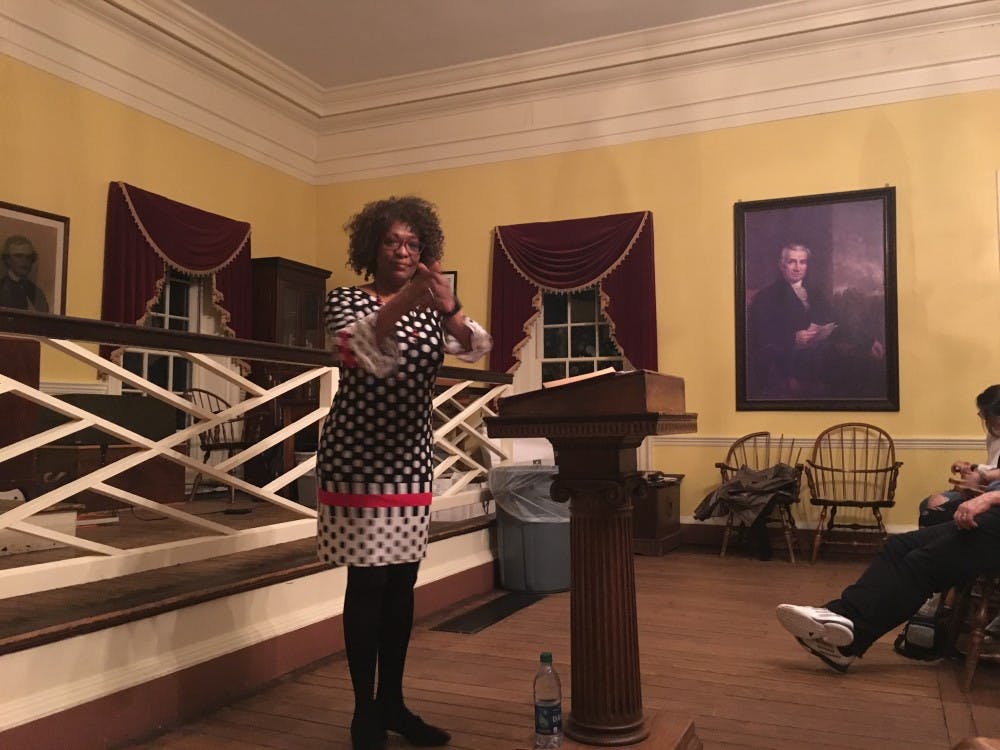The Jefferson Literary and Debating Society presented Rita Dove, the first African American poet laureate consultant in poetry to the Library of Congress, as its third speaker for their 2019 Distinguished Speaker Series in Hotel C., Jefferson Hall West Range Friday evening. About 50 people — the majority of them being Jefferson Society members — were in attendance.
So far, the Jefferson Society has hosted two other speakers — Allan Lichtman, political historian and professor of history at American University, and Jonathan Lowy, the director of the Legal Action Project and vice president of litigation of the Brady Center to prevent gun violence.
Dove has also served as the poet laureate of the Commonwealth of Virginia and has won several literary and academic awards, including the 1987 Pulitzer Prize in poetry and the National Humanities Medal in 1996 from President Bill Clinton.
Claire-Marie Brisson, graduate Arts & Sciences student, reflected on the past speakers in series and said they each presented unique topics.
“You know I’m not someone who is in politics, but I’m hearing people talk about politics...and I felt connected to it,” Brisson said. “I’m sure that people who are not into literature or language tonight [will feel] a sense of something opening for them.”
Dove titled her talk at the Jefferson Society, “Poetry, Music, and the Underside of History,” which described her journey towards her most recent book of poetry, Sonata Mulattica.
“What I’d like to do is to give you a sense of my journey as a poet which has been really irrevocably entwined with other passions from the very beginning of my career,” Dove said. “Those passions include music, history, and German language and literature, which don’t seem to translate to poetry but 15 or more years ago all of these artistic and intellectual love affairs finally culminated in a book…Sonata Mulattica.”
The lecture combined narrative aspects describing Dove’s discovery of George Augustus Polgreen Bridgetower who became the subject of her latest book of poetry and readings of her poems from Sonata Mulattica. Dove had high hopes for her latest creative work. Bridgetower was an Afro-European musician who had performed with Beethoven and had befriended him through their common interests in music but later fell out with him.
Dove began her talk by reading “The Witness,” which describes the death of George Bridgetower. Before giving context as to what the poem was about, Dove wanted her audience to question, “Who was this dark-skinned man? And why does it matter? And why should we care?”
She then explained the life of George Bridgetower who “was the product of a European mother, and a father who was known as the African prince.” Bridgetower was a violin prodigy, who enjoyed the patronage of the Prince of Wales and inspired Beethoven to compose and dedicate his violin Sonata in E major to him.
Throughout her story of Bridgetower, Dove wove in details of her own life. Dove described growing up as an African American in Ohio and being shy and picking up the cello.
After speaking for about 50 minutes, she took questions for around 30. Some of the questions included how to be an “ethical narrator” and the role of the German language in her work.
She said that the intention to be an ethical narrator prepares you to be one and told how her love of the German language has led to a focus on grammar, particularly on verb placement — because in German, verbs are always placed at the end of sometimes very complex sentences.
Kristen Barrett, third-year College student and president of the Jefferson Society, said this speaker in the series was especially significant to her as a black woman.
“[As] someone who is very interested in writing and has dealt with a lot of the same issues, like what it means to be an ethical narrator and how close to facts you have to stick when you’re writing these sort of historical fiction like pieces,” Barrett said.
Corey Runkel, third-year College student and member of the Jefferson Society, said he thought Dove was the best speaker he has heard in the past year.
“She has perfect comedic timing,” Runkel said. “Usually when people come, especially academics, they don’t let us in to how their process works….and this one was all about the research, and how she forms the works that she does.”
Brisson added that Dove makes poetry accessible to people who may not have any experience with reading or writing it.
“I think that it’s beautiful that poetry is alive in the halls tonight — that we’re able to hear someone reading what she has written,” Brisson said.







